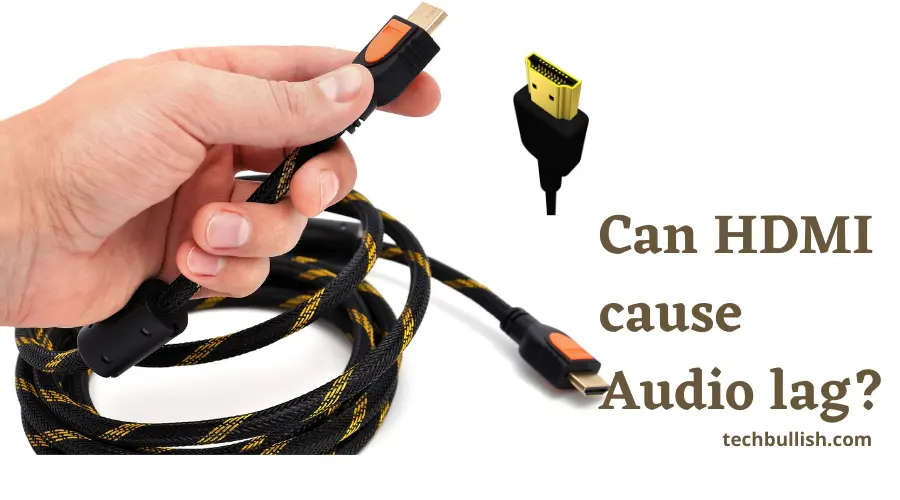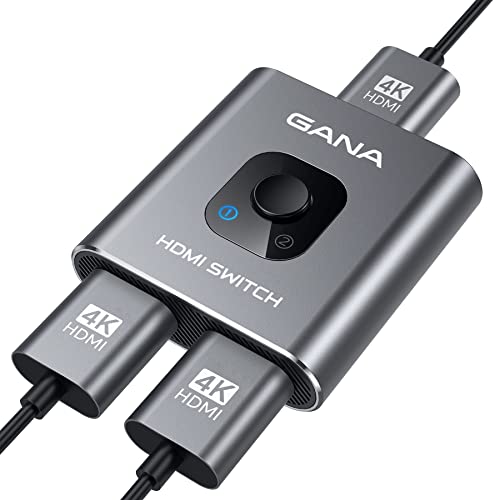Many of us can become very confused and feel overwhelmed when it comes to technology. One such device is HDMI.
HDMI has become the industry’s de-facto standard for handling high-definition media content, a new video standard that brings together HD video and digital audio in a single cable.
Not only is HDMI the standard for high-definition, but it’s also the communication protocol for all devices to connect.
Without HDMI, you can’t connect any other device to a TV, for example.
However, HDMI isn’t the only game in town. If you are looking for a post on whether HDMI can cause Audio lag, this is the right post.
The truth is that it’s not the cables that cause the issue; it’s the device itself.
The newest trend in televisions is using HDMI to connect speakers and televisions.
From sleek, slim bezels that reduce the size of the television set to higher quality audio and video, HDMI promises a better experience.
However, can HDMI cause audio lag?

Let’s get started!
Can HDMI cause Audio lag?
HDMI cables do not cause Audio lag directly. Audio lag is caused majorly by the Video Processing delay or sync issue which is not related to the HDMI cable.
Many people have noticed that HDMI is associated with Audio lag.
They are quick to assume that HDMI then causes the audio lag itself.
But the issue could be deeper than some might realize.
Take time to assess the problem correctly and then find a solution.
That is how many pro-repair teams will approach the issue over time.
The process is simple, and people want it to work for their TV unit.
You should also ensure you use the correct cables as HDMI cables differ significantly in the quality of the connections.
Some HDMI cables will support digital Audio, and others will not.
It is essential to learn how to test the cables to get the best quality HDMI cable for your TV unit.
HDMI is a new and innovative way of connecting sound and images for an optimal viewing experience.
With recent advancements in technology, we would expect little to no slowdown between sound and picture.
Can HDMI cause lip-sync issues?
HDMI cables can cause lip-sync issues and Audio lag, among other problems. Lip sync is a big issue with HDMI cables.
The sound is meant to match the image, and if not, it causes a considerable lousy experience for viewers. There are also cases of video lag experienced with HDMI cables which may lead to viewers missing something important on-screen.
To fix the issue, you need to ensure you buy the right cables.
If you have problems with lip-sync, make sure you use the correct HDMI cables.
Video data portray the speaker on TV, and Audio recording data blare their voice.
The two data sets have to merge correctly for the experience to work.
Some users report having some problems with lip-sync issues.
The speaker will move without the audio working as it should.
That is problematic and could show some issues in the future.
The lip-sync issues have been a significant problem in the past as well.
How To Stop HDMI Audio Lag?
Audio lag is when you press a button on your game controller, and the sound comes out of your TV speakers.
Tune in to a live sports event, a football game, for example.
You will hear the commentators talk about what’s happening on screen before it visually happens because of audio lag, which can be up to 20 seconds behind.
The audio lag is caused by a delay in the HDMI audio signal coming from the game console.
The HDMI audio is created when you press buttons on the controller in the game, and the HDMI audio signal is sent to the TV.
Here are the steps which you can take to stop HDMI Audio lag:
Get a new HDMI cable
HDMI is a cable standard that can transmit uncompressed digital Audio and video. Some TVs have an audio lag with HDMI cables when playing video games.
Audio delay can be caused when the TV is trying to process too much data at once, in which case you will need to purchase another HDMI cable with less bandwidth to avoid this issue.
Last update on 2025-06-30 / Images from Amazon Product Advertising API
Update your firmware
HDMI has evolved, but it’s still not perfect even with the updates.
Audio lag is one of the significant drawbacks of HDMI, primarily when gaming.
Pixel response time can often go unnoticed by most people watching movies or playing video games.
But if you are an audio enthusiast, you will know the difference immediately.
It may not be the HDMI cable causing the audio lag, and you need to check the device firmware for updates and get to the latest version.
Update your drivers
No one likes to deal with the frustration of constant crashing and glitches that come from outdated drivers.
You can avoid frustration by updating your drivers.
For a driver to work correctly, it has to match the software running on your computer.
Not only can video cards have outdated drivers, but audio devices may also have outdated drivers, which could result in audio lag.
As new software gets released, you may have to update your drivers.
Fortunately, updating drivers is a simple process and can be done in just a few minutes.
Download and run the latest driver update. The update should be automatically downloaded and installed on your computer.
Check your sound settings on both devices
Audio lag can be an issue if your sound settings are not configured correctly for both devices.
Windows detects a new driver, and it automatically configures your audio settings according to the latest driver.
If you do not hear sound from both devices, you may need to configure Windows to use a different audio profile for each device.
Check where you find your audio settings and select the correct audio profile for each device in both the Devices and Printers properties and the Sound settings in the Printers properties.
Using Shorter HDMI Cables
If you use long HDMI cables, it is better to use a shorter one per the distance between your TV and speakers.
A sound has to travel through wire or air before it gets into your TV speakers.
And then, if the wire is long, that means that the sound will take longer to get through, which will cause a lag in Audio.
This is why HDMI cables have to be shorter than your TV speakers so that you can shorten them.
Take TV to repair Shop
Take the TV to a repair shop for some pro help.
They likely understand the HDMI compatibility issues thoroughly, and they have experience handling the issues and getting the TV to work right.
But the repair shop will have the tools on hand to manage the problem.
The HDMI audio lag is a common problem for the TV owner, and they can trust the repair team to fix it in time.
Does HDMI reduce audio quality?
HDMI does not reduce the audio quality of your TV.
HDMI is a method of transferring digital data from one device to another.
If data is not transferred at a sufficient speed, Audio may be compromised.
Audio lag may occur when the video and audio are not synchronized to the same time frame.
This synchronization allows for a higher quality sound experience but can also cause latency and interruptions in Audio and video.
HDMI has been criticized for its effects on audio quality and synchronization.
An HDMI cable 1.4 can physically transmit a digital signal at a rate of up to 10.2 Gbps. Using an HDMI cable to connect two devices with a wired connection can result in audio and video synchronization issues.
Ideally, the HDMI will enhance the audio data, and that is how the system was designed in the first place.
But corrupt HDMI cables can mar the audio data in time, and that causes problems to emerge, and people want a better system in place.
You can fix the HDMI system to utilize the audio data correctly.
When Audio travels from one place to another, it can get lost or distorted.
HDMI cables are better at handling sound because they pass the Audio through without changing it.
HDMI cables help keep your music cleaner, which means you hear all the words and sounds just the way the artists wanted you to.
Does an HDMI audio splitter bring in latency?
An HDMI splitter allows you to share your audio source with multiple TVs.
There are some reports that it can bring in latency which is the delay between the sound and picture.
How does this work?
A sound has to travel through wire or air before it gets into your TV speakers.
And then, if the wire is long, that means that the sound will take longer to get through, which will cause a lag in Audio.
This is why HDMI cables have to be shorter than your TV speakers so that you can shorten them.
Latency is an issue when the Audio lags behind the video.
That is common, and splitting the HDMI can cause it.
The splitter will work if it is installed correctly. Be sure to check the HDMI cable and the splitter once installed.
That could correctly redirect the Audio. Expect better results when the HDMI splitter has been installed as is possible.
Last update on 2025-06-30 / Images from Amazon Product Advertising API
Does HDMI cable affect gaming Audio?
Video gamers know that their setup is not complete without the video and Audio.
The HDMI cable connects the TV with the gaming device and can create a more immersive experience for gamers.
However, some people might still think there is a delay in the audio when watching a movie or playing a game – this is known as audio lag.
HDMI cables are used to transfer audio and video data.
The cable is typically not the problem but could cause problems if the connection is not working correctly.
If the HDMI cable was not hooked up correctly or something was wrong, it could affect the Audio for games.
The gaming system is hooked up to the TV unit, and the HDMI cable connects the TV with the gaming device.
Some users report lesser quality of their audio experience.
They should also take the TV unit to a repair shop. They can identify problems, such as a worn cable.
Then the device can be repaired or replaced as needed.
Conclusion
Let’s conclude the post on whether HDMI can cause Audio lag!
An HDMI cable is a digital interface that transmits images and sound between two devices.
The transmission is uncompressed, enabling higher resolution content with less loss in quality.
An HDMI cable can also transmit audio and video, leaving some users questioning the audio lag when playing games on a TV such as Xbox One.
Some say there is no audio lag when using an HDMI cable, while others say it is noticeable.
In conclusion, you should use HDMI cables for the best visual and sound quality.
HDMI cables are not just for high-end devices; you can use them with TVs, speakers, and video games to enhance the experience.
Although some people might think HDMI cables can cause audio lag, there is no scientific evidence to support this claim.
The video signal will not degrade as it travels on an HDMI cable, and the audio signal will not suffer from any lag.
Consumers should always use HDMI cables and not other alternatives to ensure the best possible experience.
I hope you enjoyed reading this post.

I’m Anirban Saha, Founder & Editor of TechBullish. With a B.Tech in Electronics and Communication Engineering, and 6+ years of experience as a software developer, I have expertise in electronics, software development, gadgets, and computer peripherals. I love sharing my knowledge through informational articles, how-to guides, and troubleshooting tips for Peripherals, Smart TVs, Streaming Solutions, and more here. Check Anirban’s Crunchbase Profile here.





![avedio links HDMI Splitter 1 in 2 Out [with 4 Ft Hdmi Cable] Not for Extended Mode-Mirror Same Screen Only, 4K 1x2 HDMI Splitter 1 to 2 for 3D 1080P@60Hz, Copy 1 Source to 2 Displays at The Same Time](https://m.media-amazon.com/images/I/412VNL8UP8L.jpg)
